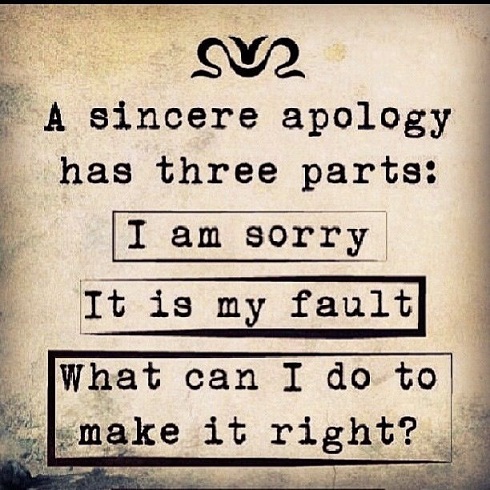Strangely, some see an apology as a sign of weakness! Au contraire! A from-the-heart “sorry” is a sign of a secure, strong, anchored from within personality. Only the weak worry about appearing weak. Fake apologies abound; a “sorry” casually tossed out into the ether quickly followed by limiting words that absolve the issuer from any true responsibility. The classic “I’m sorry but…” removes virtually all meaning. Faux apologies are devoid of remorse or regret, lacking in any attempt at meaningful recovery.
“Apologies involve an admission of wrongdoing and people with fragile self-esteem
— like narcissists whose self-esteem is high but also brittle —
can be highly resistant to apologizing as they feel it is threatening to their egos.”
– Guy Winch, author “Emotional First Aid:
Healing Rejection, Guilt, Failure, and Other Everyday Hurts.”
Strong individuals, secure people, are quick to acknowledge error, to make things right, to learn and grow. They know they are not perfect, they know no one is without flaw. They are also not afraid of their fears. They are secure in the knowledge that most of our fears are survivable and the long term cost of defending (lost love, opportunities foregone, low trust messages broadcast to world and copied/repeated by others) far exceeds the “threat” we choose to fear. Sincere apologies coupled with appropriate recovery efforts can reduce tensions and strengthen human bonds, both of which are excellent for our mental health and physical health as well: lowered stress levels and a strong network of relationships have a better correlation with longevity than either exercise or diet!
Closing Quotes:
“It takes a great deal of character strength to apologize quickly out of one’s heart rather than out of pity. A person must possess himself and have a deep sense of security in fundamental principles and values in order to genuinely apologize.” – Stephan Covey, 1932-2012
“Never ruin an apology with an excuse.” – Kimberly Johnson
“Right actions in the future are the best apologies for bad actions in the past.” – Tryon Edwards, 1809-1894
As always, I share what I most want/need to learn. – Nathan S. Collier



0 Comments